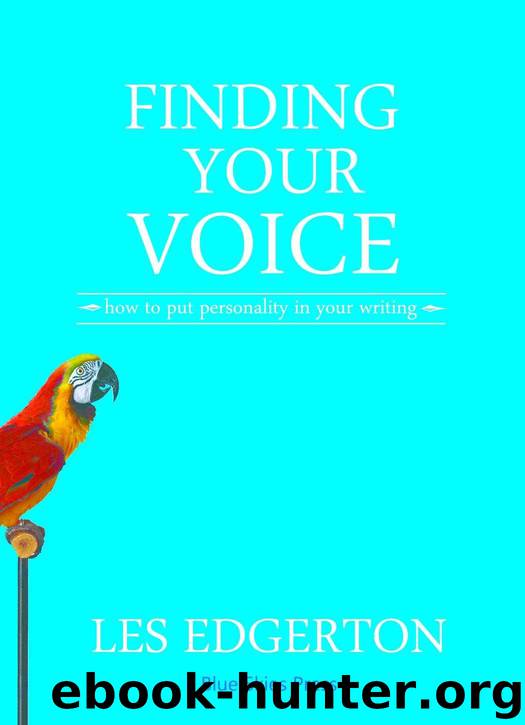Finding Your Voice: How to Put Personality in Your Writing by Edgerton Les

Author:Edgerton, Les [Edgerton, Les]
Language: eng
Format: mobi, epub
Publisher: Blue Skies Books
Published: 2012-04-16T00:00:00+00:00
Vocabulary
Although tone is the most important component of voice, the element that is responsible for more writers being “writerly” is the vocabulary they utilize in their writing. While the tone can be true to your own unique voice—a lackadaisical or even “lazy” selection of the words chosen can drive your personality right on out of the piece at a speed, which, if you were driving on the open highway, would result in a ticket and mandatory attendance at a series of safe driving classes.
As you might guess, a lot of substitutions in our word choices take place when we rewrite our material.
Here's a common example of what happens. A student of mine recently wrote this sentence in the story she was working on in class: A scream spewed out of her throat. (Offending word in italics.) She used the word “spewed” in a praise-worthy effort to come up with original language, but it failed. “Spewed” is an action reserved for lava emissions from volcanoes or Texas tea erupting from oil wells, but not for screams, as a rule. Just doesn't describe the way a scream comes out of one's throat very accurately at all. In her original version, the writer had written, ”A scream tore from her throat.” I'd written in my comments that that was a clichéd way of describing a scream, and she then came up with “spewed.” An honest effort, but unfortunately, misguided. She looked more for a word to impress (what being “writerly” is all about), than for a word to be clear and original. She got the original part right, but kind of fell down on the clear requirement that goes into a good word choice. And, being clear is the first obligation of writing. Well . . . the co-first requirement. Being interesting is just as important.
Anyway, this student got it right on the next try when she came up with: She screamed.
Says it all. Without being writerly. Doesn't get in the way of the prose and doesn't draw attention to itself. Simply and clearly describes what this character did. She screamed. This cuts the wordiness and simply tells what the character did. And the story goes on, uninterrupted.
The rewriting period is the prime time for the Roget to come off the bookshelf and make an appearance next to our computer, and that's when we're in the most danger of departing from our own language. During rewriting periods are the times when we really need to pay attention to what George Bernard Shaw meant when he said, “In literature, the ambition of the novice is to acquire the literary language; the struggle of the adept is to get rid of it.”
I'm not saying it's never a good idea to consult a thesaurus. I'm just suggesting that you be careful! Try not to choose substitutes that are too foreign to your usual vocabulary, that's all. That doesn't mean you should eschew every word you're not already familiar with, but simply become familiar with that word before you substitute it for a word you are comfortable with.
Download
Finding Your Voice: How to Put Personality in Your Writing by Edgerton Les.epub
This site does not store any files on its server. We only index and link to content provided by other sites. Please contact the content providers to delete copyright contents if any and email us, we'll remove relevant links or contents immediately.
Asking the Right Questions: A Guide to Critical Thinking by M. Neil Browne & Stuart M. Keeley(5775)
Autoboyography by Christina Lauren(5234)
Eat That Frog! by Brian Tracy(4536)
Dialogue by Robert McKee(4400)
Sticky Fingers by Joe Hagan(4197)
Journeys Out of the Body by Robert Monroe(3624)
Annapurna by Maurice Herzog(3467)
Full Circle by Michael Palin(3448)
Schaum's Quick Guide to Writing Great Short Stories by Margaret Lucke(3380)
Elements of Style 2017 by Richard De A'Morelli(3349)
The Art of Dramatic Writing: Its Basis in the Creative Interpretation of Human Motives by Egri Lajos(3067)
Atlas Obscura by Joshua Foer(2961)
Why I Write by George Orwell(2952)
The Fight by Norman Mailer(2940)
The Diviners by Libba Bray(2937)
In Patagonia by Bruce Chatwin(2928)
The Mental Game of Writing: How to Overcome Obstacles, Stay Creative and Productive, and Free Your Mind for Success by James Scott Bell(2908)
Venice by Jan Morris(2573)
The Elements of Style by William Strunk and E. B. White(2473)
